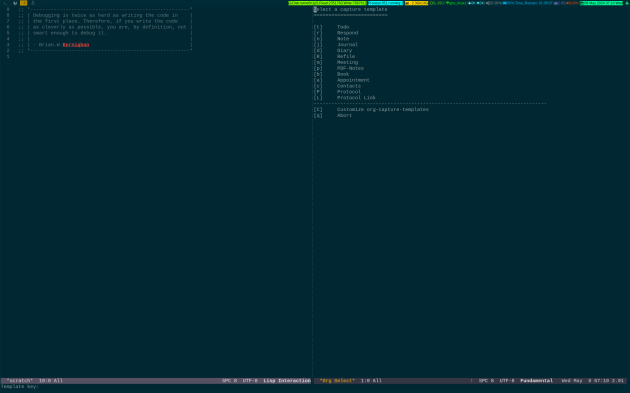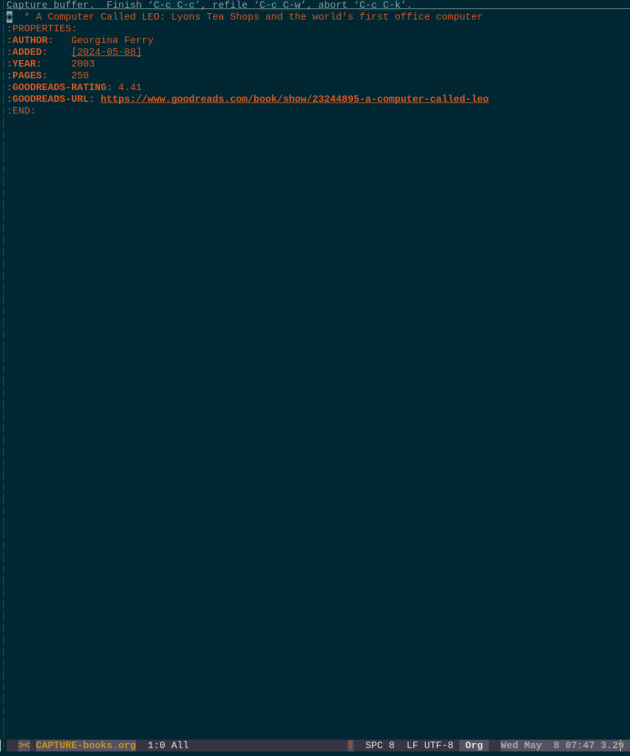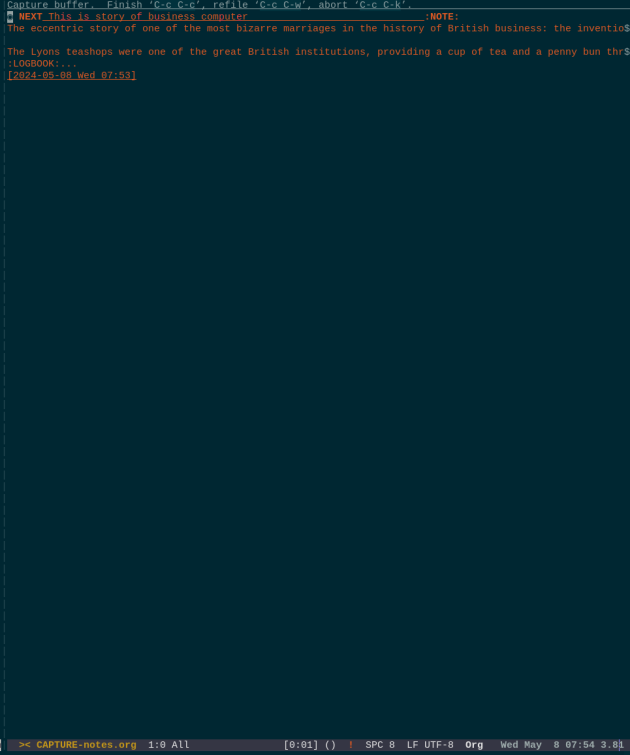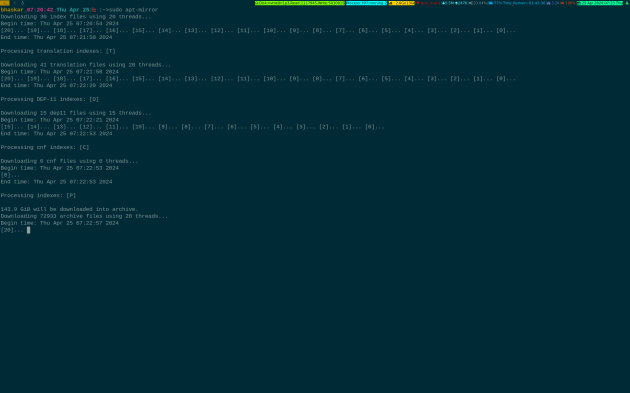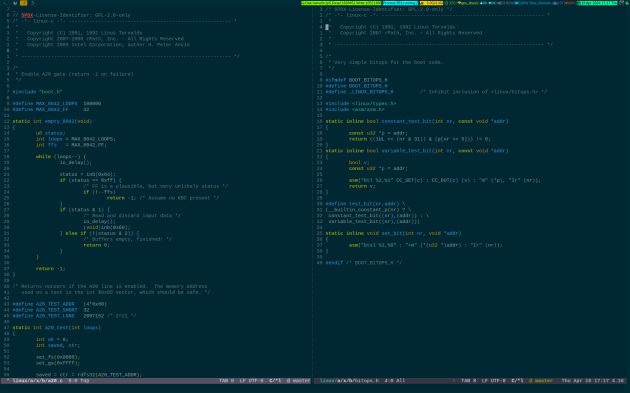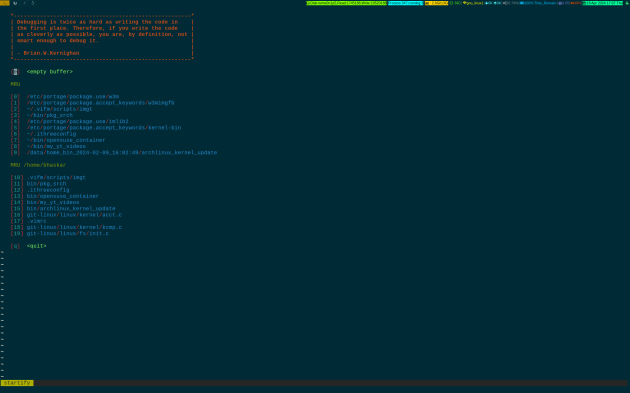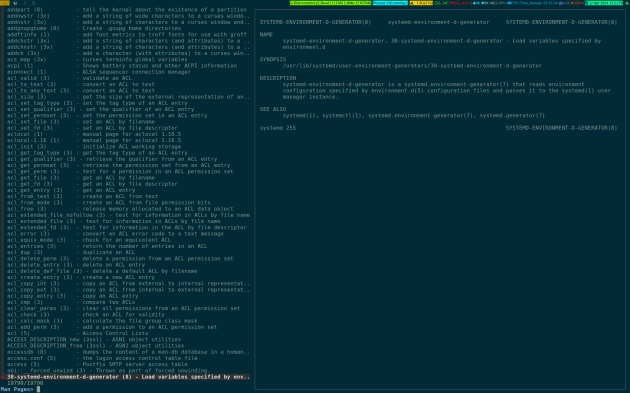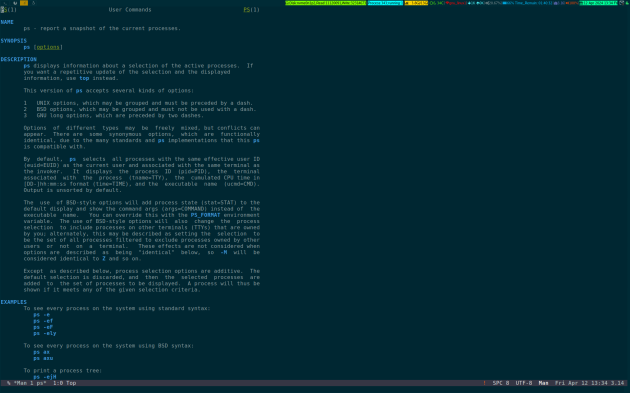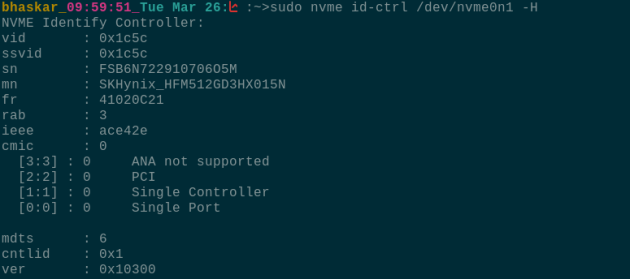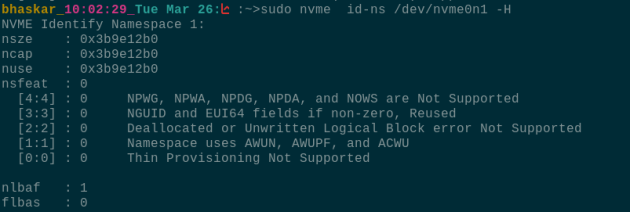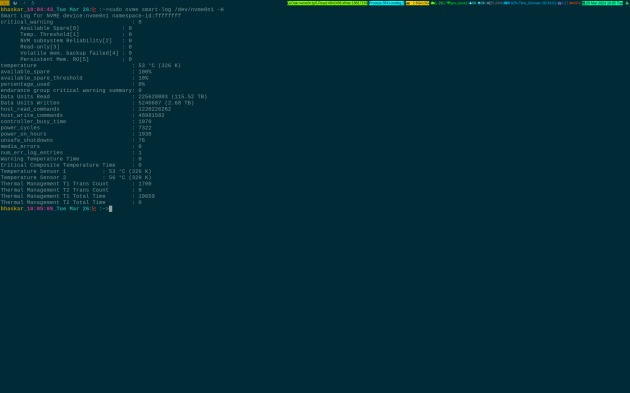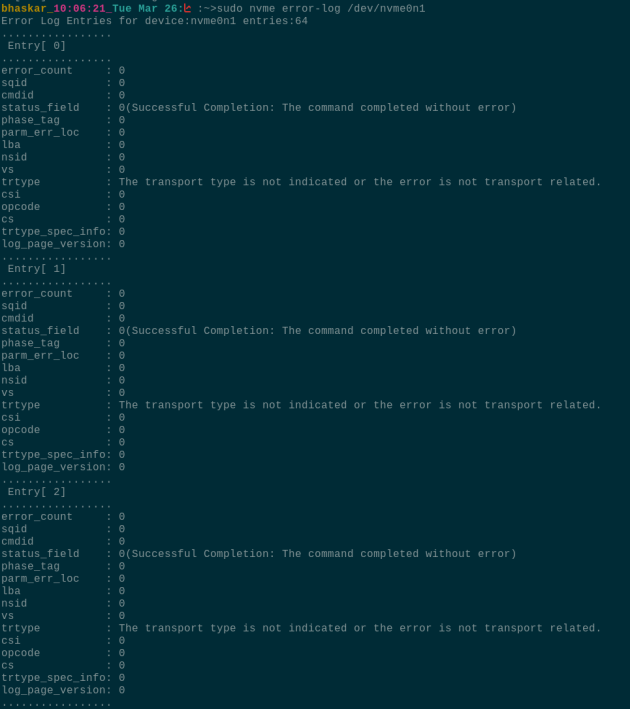Alright, Linux Fanatics never stops trying various things aka exploring, especially when they are young and exuberant. We all have been trapped in that vicious activity for years just for perfection. Alas! Despite our endless hours search and doing various crazy things, we are just not settling on a particular thing.
Distro hopping is considered very normal and in fact, a desired activity seen by other fellas in the field of the same. Not doing so, considered that serious limitation of your intellect and capabilities and is sometimes frowned upon. So, as a result, we all dive in with aplomb and do as many crazy things as possible. But that does not end there, we go one step further and claim our specific work is a kinda standard and others should follow.
This is a vibe and not necessarily told explicitly otherwise. Any enthusiasts with little sense get it within a few days of foray into this bandwagon. And it doesn’t take too much to be part of it. Especially the shortcoming of our knowledge about the internals initially makes it even more possible. The suggestions you are getting everywhere, on all the online places, namely, forums and site specifics to support provide you with weird suggestions to try out. And our brains are so triggered by those suggestions and we do not waste time to head on to try all that said. Such a force.
Likewise, the beauty of open-source software is that your problem no longer stays unresolved for too long. How? Someone like you might encounter it and find a solution to that problem and post it online somewhere so others get the benefit of that finding. Such a boon. But, wait, there are lots of presumptions regarding that. It is not always the case. Sometimes, suggestions are way off and done in assumption and importantly in very different situations and environments. People get stumped by that very often with a late realization. The temptation to find the solution is so high that people ignore the basics of understanding and have an unfathomable inclination to adopt whatever is thrown at them.
You learn some by reading those offerings and loathe some. Not to mention, in between creeps devilish idea to put on the sword’s edge to get the sadistic pleasure of your unawareness. But, don’t worry you will learn fast, how to avoid those evils. They follow some patterns and it is very vivid despite their motivated effort.
Moreover, every damn Linux distribution offers some flavor to make themselves different from the others. Sometimes, it is a business policy, and others are driven by some sort of inexplicable ethos for design. Also, people offering those distributions came from different backgrounds and understandings, so baked that into their loved stuff. As a result, we as an end user get various flavors to try on.
People start to play with them having installed in the physical partitions( many many moons ago, and I belong from that era), and then comes virtualization, which makes things easier to try something and not touch the base system. Plus, you do not have to wrongly erase in the process the wrong drive having different things.
Now, why do people try that I have said it at the outset of this article. But there are more, namely, people get bored with one thing, different looks and feel, and missing capabilities on one and finding it on the other. I have personally tried at least 30 of various offerings(nope, I am not ashamed of that) before setting on finally a few selective ones. It is a process that takes years to neck deep in the ecosystem to get along and find out the pros and cons(like every other thing in life). But, the realization kicks in with various factors come into play. In your pursuit of finding the silver bullet (that’s taken out Fredrick. P. Brooks, Jr’s paper by the same name)conclude that there is NO silver bullet to all our desired Linux distributions. There never will be.
The availability of preferred software packages is not consistent and sometimes does not even ship. The awkward naming scheme of the same packages for different distributions confused end users and forced them to search more. Nope, compiling from is NOT the norm, until you are forced, desperate, and capable of resolving the glitch by looking or it in the code or asking various places on the internet, many people I have seen, don’t ask questions and they are stuck with their fallacy. They thought asking questions publicly was a matter of shame and not good for their ego and status. So, they suffer the most by being dumb and spending a hell of a time doing things they are not supposed to do.
We all know that Eric. S. Raymond wrote a template, that should be the basis of asking questions in places where you seek help. Not so surprisingly, the majority of the people initially do not read it or find it and know it, so make fault by putting the way they feel it helps them to answer their query. Not the way it is. So, eventually, someone wise enough to point that document to them insists on reading for their betterment. Those who do, have an edge over others in the future of getting help.
To make things easy for people with an unavoidable need to hop between various distributions, I have written an ordinary script(inspired by some other people’s already-written ideas) to download and verify the chosen distribution. Some of the stuff might need some careful updates because it is been a while since I haven’t updated the script. I am expecting the user will be curious enough to find the missing part and update accordingly.
Here is the script entirety for your perusal 🙂
#!/usr/bin/env bash
# Download and verify Linux distribution installers/ISO images
# Modified version of https://github.com/nodiscc/distrib-dl
set -o errexit
set -o nounset
set -o pipefail
usage="$(basename $0) DISTRIBUTION1 [DISTRIBUTION2 DISTRIBUTION3 ...]"
##############################
# Configuration
### GENTOO (LIVE DVD)
# https://www.gentoo.org/downloads/signatures/
gentoo_release="20160704"
gentoo_image="livedvd-x86-amd64-32ul"
gentoo_gpg2_fingerprint="D99EAC7379A850BCE47DA5F29E6438C817072058"
### DEBIAN
# one of: amd64-i386 amd64 armel armhf i386 ia64 kfreebsd-amd64 kfreebsd-i386 mips mipsel multi-arch powerpc s390 s390x source sparc
debian_architecture="amd64"
debian_version="10.3.0"
debian_gpg2_fingerprint="DF9B9C49EAA9298432589D76DA87E80D6294BE9B"
### FREEBSD
freebsd_version="12.0"
### SLACKWARE CURRENT
slack_release="slackware-current-mini-install"
slack_md5sum="8c48b807e1313c0431166786a6296a4f"
### ARCH LINUX
arch_release="2020.04.01-x86_64"
arch_image="archlinux-20202.04.01-x86_64"
arch_gpg2_fingerprint="0E8B644079F599DFC1DDC3973348882F6AC6A4C2"
#change the below date manually
rel_date="2020.04.01"
### OpenSUSE TUMBLEWEED
opensuse_release="tumbleweed"
opensuse_image="openSUSE-Tumbleweed-DVD-x86_64-Current"
opensuse_gpg2_fingerprint="0x22C07BA534178CD02EFE22AAB88B2FD43DBDC284"
### UBUNTU
ubuntu_codename="eoan"
ubuntu_release="19.10"
ubuntu_image="ubuntu-${ubuntu_release}-desktop-amd64"
ubuntu_gpg2_fingerprint1="46181433FBB75451"
ubuntu_gpg2_fingerprint2="D94AA3F0EFE21092"
### VOID Linux
voidlinux_image="void-live-x86_64-20191109"
voidlinux_gpg2_fingerprint="8DEBDA68B48282A4"
### NIXOS
nixos_release="nixos-graphical-19.09.1269.09f5f3a810c-x86_64-linux"
nixos_gpg2_fingerprint1="0xFE918C3A98C1030F"
nixos_gpg2_fingerprint2="0x846FDED7792617B4"
nixos_gpg2_fingerprint3="0xC2FFBCAFD2C24246"
### FEDORA
fedora_image="Fedora-Server-netinst-x86_64-32-1.6.iso"
fedora_gpg2_fingerprint="97A1AE57C3A2372CCA3A4ABA6C13026D12C944D0"
### SOLUS
solus_image="Solus-4.2-Budgie.iso"
solus_gpg2_fingerprint="96B4A0291094A86A2B7E3367DD672FE9A2BE5892"
### CLEAR LINUX
clearlinux_image="clear-32910-live-desktop.iso"
#clearlinux_gpg2_fingerprint=""
############################
# abort on errors
set -o errexit
download_dir="$PWD"
usage="$(basename $0) DISTRIBUTION1 [DISTRIBUTION2 DISTRIBUTION3]"
#Options:
#-c only check that the url returns 200, don't download anything"
distros="Available distributions:
gentoo
debian
freebsd
slackware_current
archlinux
opensuse_tumbleweed
ubuntu
voidlinux
nixos
fedora
solus
clearlinux"
if [[ $# == 0 ]];then
echo $usage
echo $distros
fi
############################
download_gentoo() {
# https://www.gentoo.org/downloads/mirrors/
gentoo_base_url="https://mirror.bytemark.co.uk/gentoo/releases/amd64/${gentoo_release}/"
gentoo_iso_filename="${gentoo_image}-${gentoo_release}.iso"
gentoo_sums_filename="${gentoo_iso_filename}.DIGESTS.asc"
gentoo_gpg2keyring_filename="${gentoo_iso_filename}.DIGESTS.sig"
if [[ ! -d "$download_dir/gentoo/" ]]; then mkdir -p "$download_dir/gentoo/"; fi
echo "[distrib-dl] INFO: Downloading gentoo keyring, checksums and signature..."
gpg2 --keyserver hkps://keys.gentoo.org --recv-keys "$gentoo_gpg2_fingerprint"
wget -N -nv --show-progress -P "$download_dir/gentoo/" "${gentoo_base_url}${gentoo_gpg2keyring_filename}"
wget -N -nv --show-progress -P "$download_dir/gentoo/" "${gentoo_base_url}${gentoo_sums_filename}"
gpg2 --verify "gentoo/${gentoo_sums_filename}"
echo "[distrib-dl] INFO: Downloading Gentoo Live ISO image..."
wget --continue -N -nv --show-progress -P "$download_dir/gentoo/" "${gentoo_base_url}/${gentoo_iso_filename}"
echo "[distrib-dl] INFO: Verifying Gentoo Live ISO image integrity..."
cd "$download_dir/gentoo/" && sha512sum --ignore-missing -c <(cat ${gentoo_sums_filename}) && cd -
}
download_debian() {
debian_base_url="https://cdimage.debian.org/debian-cd/current/amd64/iso-cd"
debian_iso_filename="debian-${debian_version}-${debian_architecture}-netinst.iso"
debian_sums_url="${debian_base_url}/SHA512SUMS"
debian_sums_sign_url="${debian_base_url}/SHA512SUMS.sign"
if [[ ! -d "$download_dir/debian/" ]]; then mkdir -p "$download_dir/debian/"; fi
echo "Downloading Debian keyring, checksums and signature..."
gpg2 --keyserver hkps://keyring.debian.org --recv-keys "$debian_gpg2_fingerprint"
# shellcheck disable=SC2086
wget -N -nv --show-progress -P "$download_dir/debian/" "$debian_sums_url"
# shellcheck disable=SC2086
wget -N -nv --show-progress -P "$download_dir/debian/" "$debian_sums_sign_url"
echo "Verifying Debian signature..."
gpg2 --verify "$download_dir/debian/SHA512SUMS.sign" "$download_dir/debian/SHA512SUMS"
echo "Downloading Debian ISO image..."
# shellcheck disable=SC2086
wget --continue -N -nv --show-progress -P "$download_dir/debian/" "$debian_base_url/$debian_iso_filename"
echo "Verifying Debian ISO image integrity..."
cd "$download_dir/debian/" && sha512sum -c <(cat SHA512SUMS) && cd -
}
download_freebsd() {
freebsd_base_url="https://download.freebsd.org/ftp/releases/amd64/amd64/ISO-IMAGES/${freebsd_version}"
freebsd_iso_firlename="FreeBSD-${freebsd_version}-RELEASE-amd64-memstick.img"
freebsd_sums_filename="CHECKSUM.SHA512-FreeBSD-${freebsd_version}-RELEASE-amd64.asc"
freebsd_sums_url="https://www.freebsd.org/releases/${freebsd_version}R/${freebsd_sums_filename}"
freebsd_gpg2keyring_url="https://www.freebsd.org/doc/pgpkeyring.txt"
if [[ ! -d "$download_dir/freebsd/" ]]; then mkdir "$download_dir/freebsd/"; fi
echo "[distrib-dl] INFO: Downloading freebsd keyring, checksums and signature..."
# shellcheck disable=SC2086
wget $wget_opts --timestamping --no-verbose --show-progress -P "$download_dir/freebsd/" "$freebsd_gpg2keyring_url"
# shellcheck disable=SC2086
wget $wget_opts --timestamping --no-verbose --show-progress -P "$download_dir/freebsd/" "$freebsd_sums_url"
gpg2 --verify "freebsd/$freebsd_sums_filename"
echo "[distrib-dl] INFO: Downloading freebsd ISO image..."
# shellcheck disable=SC2086
wget $wget_opts --continue --timestamping --no-verbose --show-progress -P "$download_dir/freebsd/" "$freebsd_base_url/$freebsd_iso_filename"
echo "Verifying freebsd ISO image integrity..."
cd "$download_dir/freebsd/" && sha512sum --ignore-missing -c <(cat ${freebsd_sums_filename}) && cd -
}
download_slackware_current() {
# https://slackware.uk/people/alien-current-iso/slackware-current-iso/
slack_base_url="https://slackware.uk/people/alien-current-iso/slackware-current-iso/"
slack_iso_filename="${slack_release}.iso"
slack_sums_filename="MD5SUM"
slack_sums_url="https://slackware.uk/people/alien-current-iso/slackware-current-iso/${slack_sums_filename}"
if [[ ! -d "$download_dir/slackware_current/" ]]; then mkdir -p "$download_dir/slackware_current/"; fi
wget -N -nv --show-progress -P "$download_dir/slackware_current" "${slack_base_url}${slack_sums_filename}"
echo "Downloading Slackware-current Linux ISO image..."
wget --continue -N -nv --show-progress -P "$download_dir/slackware_current/" "${slack_base_url}${slack_iso_filename}"
echo "Verifying Slackware-current ISO image integrity..."
cd "$download_dir/slackware_current/" && md5sum -c <(cat ${slack_sums_filename}) && cd -
}
download_archlinux() {
# https://www.archlinux.org/downloads
arch_base_url="http://mirror.rackspace.com/archlinux/iso/${rel_date}/"
arch_iso_filename="archlinux-${arch_release}.iso"
arch_sums_filename="sha1sums.txt"
arch_gpg2keyring_filename="archlinux-${arch_release}.iso.sig"
if [[ ! -d "$download_dir/archlinux/" ]]; then mkdir -p "$download_dir/archlinux/"; fi
echo "Downloading arch keyring, checksums and signature..."
gpg2 --recv-keys "$arch_gpg2_fingerprint"
wget -N -nv --show-progress -P "$download_dir/archlinux/" "${arch_base_url}${arch_gpg2keyring_filename}"
wget -N -nv --show-progress -P "$download_dir/archlinux/" "${arch_base_url}${arch_sums_filename}"
# gpg2 --verify "archlinux/$arch_gpg2keyring_filename" "archlinux/${arch_sums_filename}"
echo "Downloading Arch Linux ISO image..."
wget --continue -N -nv --show-progress -P "$download_dir/archlinux/" "${arch_base_url}${arch_iso_filename}"
echo "Verifying Arch Linux ISO image integrity..."
cd "$download_dir/archlinux/" && sha1sum --ignore-missing -c <(cat ${arch_sums_filename}) && cd -
}
download_opensuse_tumbleweed() {
# https://www.opensuse.org/#Tumbleweed
opensuse_base_url="http://opensuse.mirrors.theom.nz/${opensuse_release}/iso/"
opensuse_iso_filename="${opensuse_image}.iso"
opensuse_sums_filename="${opensuse_iso_filename}.sha256"
opensuse_asc_filename="${opensuse_sums_filename}.asc"
if [[ ! -d "$download_dir/opensuse/" ]]; then mkdir -p "$download_dir/opensuse/"; fi
echo "[distrib-dl] INFO: Downloading Opensuse Tumbleweed keyring, checksums and signature..."
gpg2 --keyserver hkps://keyserver.ubuntu.com --recv-keys "$opensuse_gpg2_fingerprint"
wget -N -nv --show-progress -P "$download_dir/opensuse/" "${opensuse_base_url}${opensuse_sums_filename}"
wget -N -nv --show-progress -P "$download_dir/opensuse/" "${opensuse_base_url}${opensuse_asc_filename}"
gpg2 --verify "opensuse/${opensuse_asc_filename}" "opensuse/${opensuse_sums_filename}"
echo "[distrib-dl] INFO: Downloading OpenSUSE Tumbleweed ISO image..."
wget --continue -N -nv --show-progress -P "$download_dir/opensuse/" "${opensuse_base_url}${opensuse_iso_filename}"
echo "[distrib-dl] INFO: Verifying OpenSUSE Tumbleweed ISO image integrity..."
cd "$download_dir/opensuse/" && sha256sum --ignore-missing -c <(cat ${opensuse_sums_filename}) && cd -
}
download_ubuntu() {
#http://releases.ubuntu.com/
ubuntu_base_url="http://releases.ubuntu.com/${ubuntu_codename}/"
ubuntu_iso_filename="${ubuntu_image}.iso"
ubuntu_sums_filename="SHA256SUMS"
ubuntu_gpg2keyring_filename="SHA256SUMS.gpg"
if [[ ! -d "$download_dir/ubuntu/" ]]; then mkdir -p "$download_dir/ubuntu/"; fi
echo "Downloading Ubuntu keyring, checksums and signature..."
gpg2 --keyid-format long --keyserver hkps://keyserver.ubuntu.com --recv-keys "$ubuntu_gpg2_fingerprint1" "$ubuntu_gpg2_fingerprint2"
wget -N -nv --show-progress -P "$download_dir/ubuntu/" "${ubuntu_base_url}${ubuntu_gpg2keyring_filename}"
wget -N -nv --show-progress -P "$download_dir/ubuntu/" "${ubuntu_base_url}${ubuntu_sums_filename}"
gpg2 --keyid-format long --verify "ubuntu/${ubuntu_gpg2keyring_filename}" "ubuntu/${ubuntu_sums_filename}"
echo "Downloading Ubuntu Latest Desktop ISO image..."
wget --continue -N -nv --show-progress -P "$download_dir/ubuntu/" "${ubuntu_base_url}/${ubuntu_iso_filename}"
echo "Verifying Ubuntu Desktop ISO image integrity..."
cd "$download_dir/ubuntu/" && sha256sum --ignore-missing -c <(cat ${ubuntu_sums_filename}) && cd -
}
download_voidlinux() {
# https://alpha.de.repo.voidlinux.org/live/current/
voidlinux_base_url="https://alpha.de.repo.voidlinux.org/live/current/"
voidlinux_iso_filename="${voidlinux_image}.iso"
voidlinux_sums_filename="sha256.txt"
voidlinux_gpg2keyring_filename="sha256.sig"
if [[ ! -d "$download_dir/voidlinux/" ]]; then mkdir -p "$download_dir/voidlinux/"; fi
echo "Downloading VoidLinux keyring, checksums and signature..."
gpg2 --keyid-format long --keyserver hkps://keyserver.ubuntu.com --recv-keys "$voidlinux_gpg2_fingerprint"
wget -N -nv --show-progress -P "$download_dir/voidlinux/" "${voidlinux_base_url}${voidlinux_gpg2keyring_filename}"
wget -N -nv --show-progress -P "$download_dir/voidlinux/" "${voidlinux_base_url}${voidlinux_sums_filename}"
echo "Downloading VoidLinux ISO image..."
wget --continue -N -nv --show-progress -P "$download_dir/voidlinux/" "${voidlinux_base_url}${voidlinux_iso_filename}"
echo "Verifying VoidLinux ISO image integrity..."
cd "$download_dir/voidlinux/" && sha256sum --ignore-missing -c <(cat ${voidlinux_sums_filename}) && cd -
}
download_nixos() {
#https://releases.nixos.org/nixos/19.09/nixos-19.09.1269.09f5f3a810c/nixos-graphical-19.09.1269.09f5f3a810c-x86_64-linux.iso
nixos_base_url="https://releases.nixos.org/nixos/19.09/nixos-19.09.1269.09f5f3a810c/"
nixos_iso_filename="${nixos_release}.iso"
if [[ ! -d "$download_dir/nixos/" ]]; then mkdir -p "$download_dir/nixos/"; fi
echo "Downloading NixOS security devs keys ..."
gpg2 --keyid-format long --keyserver hkps://keyserver.ubuntu.com --recv-keys "$nixos_gpg2_fingerprint1" "$nixos_gpg2_fingerprint2" "$nixos_gpg2_fingerprint3"
echo "Downloading NixOS Graphical install ISO image..."
wget --continue -N -nv --show-progress -P "$download_dir/nixos/" "${nixos_base_url}${nixos_iso_filename}"
}
download_fedora() {
#https://getfedora.org/en/workstation/download/
fedora_base_url="https://fedora.mirrors.theom.nz/releases/32/Server/x86_64/iso/"
fedora_iso_filename="${fedora_image}"
fedora_sums_filename="Fedora-Server-32-1.6-x86_64-CHECKSUM"
#fedora_gpg2keyring_filename="${fedora_iso_filename}.DIGESTS.sig"
if [[ ! -d "$download_dir/fedora/" ]]; then mkdir -p "$download_dir/fedora/"; fi
echo "[distrib-dl] INFO: Downloading fedora keyring, checksums and signature..."
gpg2 --keyserver hkps://keyserver.ubuntu.com --recv-keys "$fedora_gpg2_fingerprint"
#wget -N -nv --show-progress -P "$download_dir/fedora/" "${fedora_base_url}${fedora_gpg2keyring_filename}"
wget -N -nv --show-progress -P "$download_dir/fedora/" "${fedora_base_url}${fedora_sums_filename}"
gpg2 --verify "fedora/${fedora_sums_filename}"
echo "[distrib-dl] INFO: Downloading Fedora Everything Netinstall ISO image..."
wget --continue -N -nv --show-progress -P "$download_dir/fedora/" "${fedora_base_url}${fedora_iso_filename}"
echo "[distrib-dl] INFO: Verifying Fedora Everything Netinstall ISO image integrity..."
cd "$download_dir/fedora/" && sha256sum --ignore-missing -c <(cat ${fedora_sums_filename}) && cd -
}
download_solus() {
# https://getsol.us/download/
solus_base_url="https://mirrors.rit.edu/solus/images/4.2/"
solus_iso_filename="${solus_image}"
solus_sums_filename="${solus_image}.sha256sum"
solus_gpg2keyring_filename="${solus_image}.sha256sum.sign"
if [[ ! -d "$download_dir/solus/" ]]; then mkdir -p "$download_dir/solus/"; fi
echo "[distrib-dl] INFO: Downloading Solus keyring, checksums and signature..."
gpg2 --keyserver hkps://keyserver.ubuntu.com --recv-keys "$solus_gpg2_fingerprint"
wget -N -nv --show-progress -P "$download_dir/solus/" "${solus_base_url}${solus_gpg2keyring_filename}"
wget -N -nv --show-progress -P "$download_dir/solus/" "${solus_base_url}${solus_sums_filename}"
gpg2 --verify "solus/${solus_gpg2keyring_filename}" "solus/${solus_sums_filename}"
echo "[distrib-dl] INFO: Downloading Solus Budgie Desktop ISO image..."
wget --continue -N -nv --show-progress -P "$download_dir/solus/" "${solus_base_url}${solus_iso_filename}"
echo "[distrib-dl] INFO: Verifying Solus Desktop ISO image integrity..."
cd "$download_dir/solus/" && sha256sum --ignore-missing -c <(cat ${solus_sums_filename}) && cd -
}
download_clearlinux() {
# https://clearlinux.org/downloads
clearlinux_base_url="https://cdn.download.clearlinux.org/releases/32910/clear/"
clearlinux_iso_filename="${clearlinux_image}"
clearlinux_sums_filename="${clearlinux_iso_filename}-SHA512SUMS"
clearlinux_gpg2keyring_filename="${clearlinux_iso_filename}-SHA512SUMS.sig"
if [[ ! -d "$download_dir/clearlinux/" ]]; then mkdir -p "$download_dir/clearlinux/"; fi
echo "[distrib-dl] INFO: Downloading ClearLinux keyring, checksums and signature..."
# gpg2 --keyserver hkps://keyserver.ubuntu.com --recv-keys "$clearlinux_gpg2_fingerprint"
wget -N -nv --show-progress -P "$download_dir/clearlinux/" "${clearlinux_base_url}${clearlinux_gpg2keyring_filename}"
wget -N -nv --show-progress -P "$download_dir/clearlinux/" "${clearlinux_base_url}${clearlinux_sums_filename}"
# gpg2 --verify "clearlinux/${clearlinux_gpg2keyring_filename}" "clearlinux/${clearlinux_sums_filename}"
echo "[distrib-dl] INFO: Downloading ClearLinux ISO image..."
wget --continue -N -nv --show-progress -P "$download_dir/clearlinux/" "${clearlinux_base_url}/${clearlinux_iso_filename}"
echo "[distrib-dl] INFO: Verifying ClearLinux ISO image integrity..."
cd "$download_dir/clearlinux/" && sha512sum --ignore-missing -c <(cat ${clearlinux_sums_filename}) && cd -
}
_main() {
wget_opts=""
while getopts ":c" opt; do
case $opt in
c) wget_opts="--spider"; shift;;
\?) echo "[distrib-dl] ERROR: invalid option -$OPTARG" >&2; exit 1;;
esac
done
for distribution in "$@"; do
if [[ "$distribution" == "gentoo" ]] ; then download_gentoo; fi
if [[ "$distribution" == "debian" ]] ; then download_debian; fi
if [[ "$distribution" == "freebsd" ]] ; then download_freebsd; fi
if [[ "$distribution" == "--help" ]]; then echo "Usage: $usage"; exit 1; fi
if [[ "$distribution" == "slackware_current" ]] ; then download_slackware_current; fi
if [[ "$distribution" == "archlinux" ]] ; then download_archlinux; fi
if [[ "$distribution" == "opensuse_tumbleweed" ]] ; then download_opensuse_tumbleweed; fi
if [[ "$distribution" == "ubuntu" ]] ; then download_ubuntu; fi
if [[ "$distribution" == "voidlinux" ]] ; then download_voidlinux; fi
if [[ "$distribution" == "nixos" ]] ; then download_nixos; fi
if [[ "$distribution" == "fedora" ]] ; then download_fedora; fi
if [[ "$distribution" == "solus" ]] ; then download_solus; fi
if [[ "$distribution" == "clearlinux" ]]; then download_clearlinux; fi
done
}
#####################
_main "$@"
Spend some time with it to help you get your stuff easily. Here is an interaction with it :






